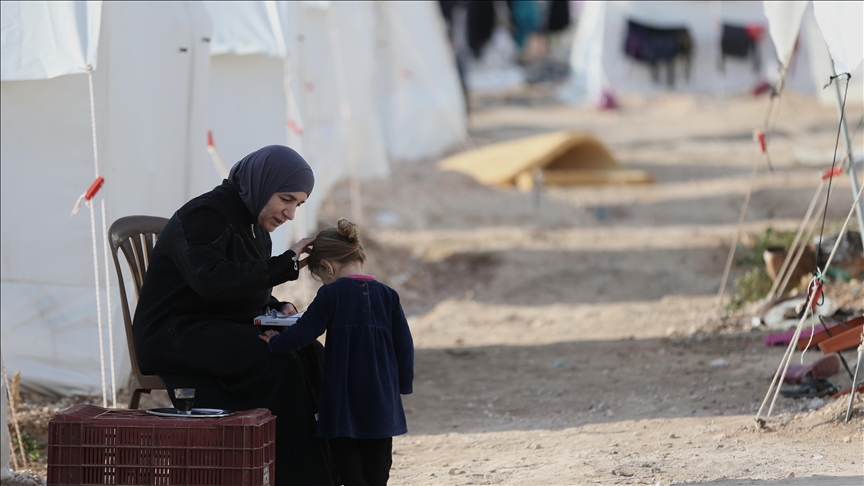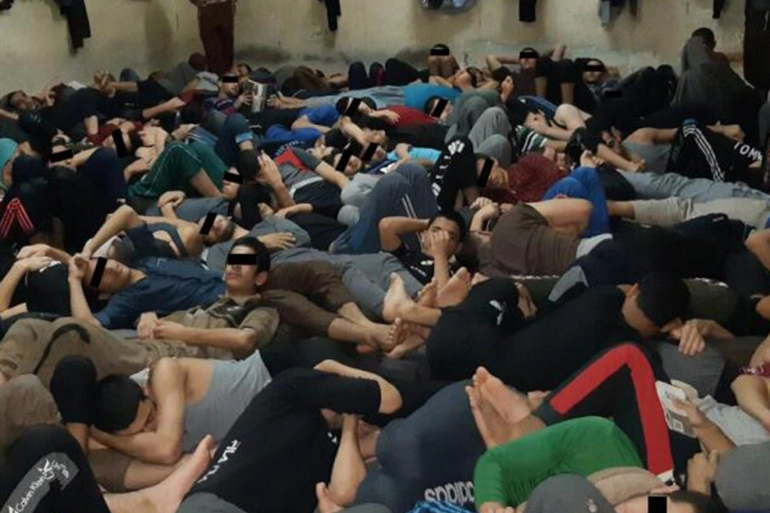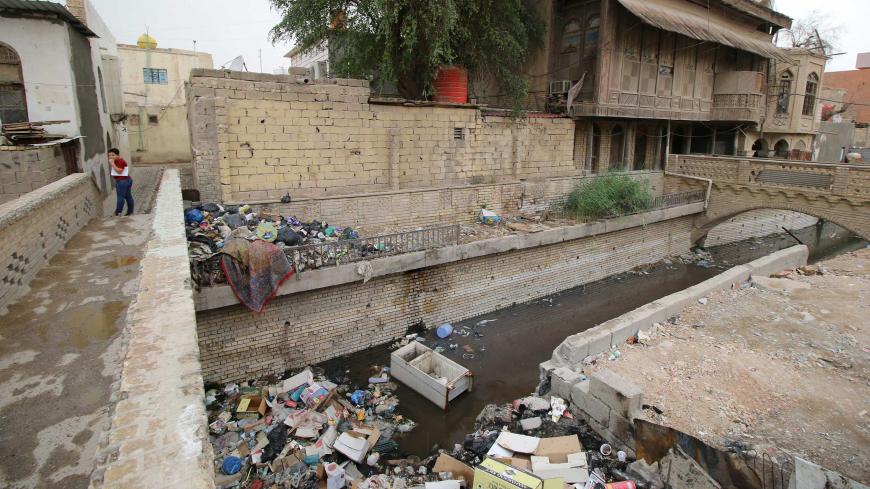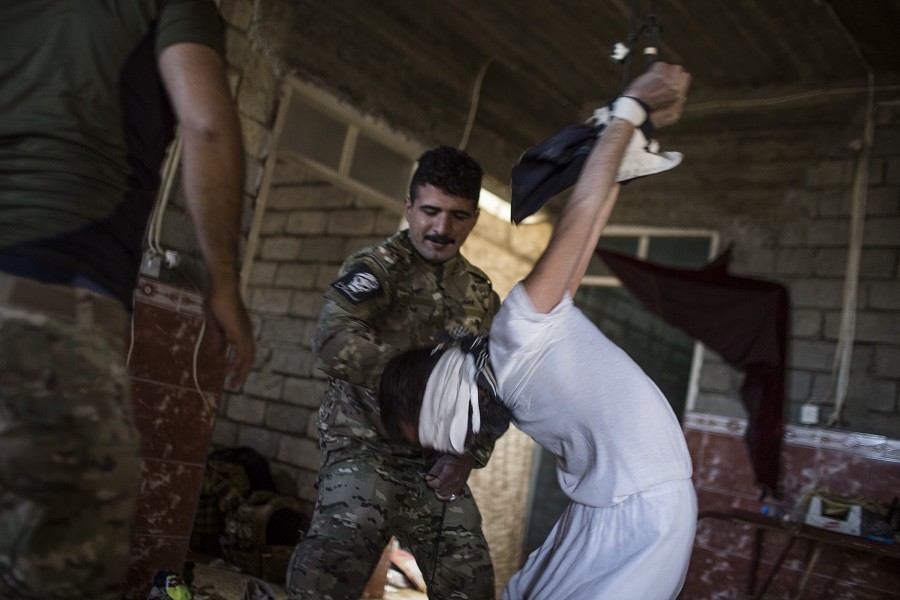The Iraqi Observatory for Human Rights said that there are at least two thousand displaced Iraqis still in the camp of Hol in the province of Syrian Hasakah displaced since 2014 from some areas of Nineveh province when they escaped from ISIS which took control the center of the province on the tenth of June 2014.
the monitoring network at the Iraqi Observatory for Human Rights said that The humanitarian situation of displaced people in the camp cannot be described: restriction of movement, lack of food and health assistance, ongoing security threat by terrorist groups and weak hope of returning to Iraq."
Displaced families can not find an opportunity to return to Iraq without the coordination between the Iraqi government and the Syrian Democratic forces that controls the area where the Hol camp is located. This is one of the reasons why the return of the displaced has been obstructed and kept in the camp since 2014.
Rabie al-Shammari in his third decade said "We want to return to our country, we're very tired, diseases are killing us, and the Iraqi government does not care about the tragedy we are living in. These conditions are making us face diseases and death without any real movement to help us."
"Two of my nephews were infected with skin diseases and we couldn't find enough medicine to treat them, no one helped us to get rid of the disease that spread in their bodies. Medical assistance here is simple, few and insufficient."
The Ministry of Displacement and Migration announced the return of a new set of Iraqi displaced persons in the camp of Hol in Syria to camps south of the city of Mosul.
Assistant Director General of Branch Affairs department in the ministry Ali Abbas Jahakeer said "The ministry cooperation with the Ministry of Transport and the leadership of Nineveh operations received at the port of Faw in the area of Senoni in Singar district of Nineveh province 444 displaced persons who had fled to the Syrian Arab Republic at the time of ISIS entering and taking over the province Mid-2014."
He also added The returnees were accommodated in Hammam al-'Alil camp south of Nineveh, while the ministry secured eight civilian wheels for transporting them to Hammam camp, as well as distributing fast food baskets."
A woman in her fifth decade, from Niue County, described herself as the mother of the hungry "Since September she has not found anything to fill the hunger of her three children, who are crying so much for hunger .l cannot do anything. My husband was killed by ISIS, no one support me here, people also cannot help me because they are displaced like me."
"We came into the camp in 2014 escaping in the desert from the organization. When we approached the Syrian border, the organization also attacked us and killed dozens of us, and until we reached the camp, we saw death with our own eyes. Now this is our situation. The children are dying from hunger."
A camp official said "We are trying to establish a contact between the Iraqi Ministry of Immigration and the authorities in Rouge Afa, we have managed to move more than 2,000 displaced people from Hasakeh to Nineveh province and have been living in the Jadja camp, but according to information they are now living in poor conditions,"
The Iraqi Observatory for Human Rights said that "the large number of displaced Iraqis in the Hol camp lives in the desert and the estimated number of 14 thousand displaced people are in confusion between staying in the camp or returning to Iraq, but even this decision is not in their hands as they are waiting to be taken by cars into the Iraqi border”.
"One of the relief workers accompanying an Iraqi deputy who took hundreds of displaced people from the Hol camp to Iraqi territory said that more than 10 children were killed in the camp during the nine months from January to September 2018 because of the diseases and epidemics and the drought that hit them as a result of hunger."
He told the Iraqi Observatory for Human Rights that "some families have not found what they eat, especially in the days when they do not receive aid and they do not get any from their neighbors in the other tents ... People there cannot think of each other because of the hunger, tragedy and humanitarian devastation that is hitting the camp."
The UNHCR said There are about 18,000 Iraqi refugees, mostly from Nineveh, Salahuddin and Anbar, who live in extremely difficult humanitarian conditions in light of the severe lack of essential services needed by the refugees,".
"The displaced people are suffering from a severe shortage of daily necessities, both in terms of housing, humanitarian aid and food, as well as health and other services, such as electricity and sewage."
"Despite all the efforts exerted by the Iraqi Ministry of Immigration and the Kurdistan Regional Government to transfer tens of thousands of refugees from the Hol camp to Iraqi territory, there are still a large number of them contemplating returning to their areas liberated from the grip of ISIS, in addition to 5000 children hoping to join Classes of education ".
The Iraqi Observatory for Human Rights said that it is the responsibility of the Iraqi government to return the displaced Iraqis in Syria to their areas of origin in Iraq and provide a safe return to them, so stay longer within the Syrian territory is a threat to them, especially as the organization targeted them more than once and killed dozens of them.
The Observatory called on the Iraqi Prime Minister to make every effort to alleviate their suffering and provide them with assistance so that they can obtain a minimum standard of living.




